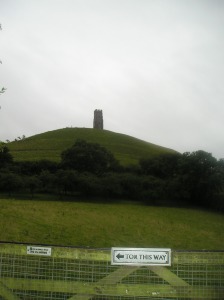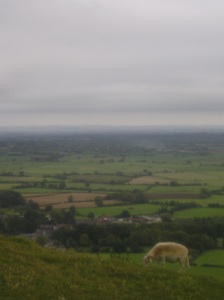The James brothers on Tor
To the sandstone hills and crumbling churches of Somerset for a discursive, autumn ramble between Wells and Glastonbury. Five brothers have galloped from the corners of the kingdom to assemble in front of the mighty cathedral and spirits are running high. There are eight miles between here and the Tor that grows like a bunion on the foot of this ancient county.

Paul ushers us inside the cathedral for a whistle-stop tour of the sights – the impressive bishop’s chamber (rechristened the Council of Elrond for the day) where each James boy chooses a seat in the light filled room. I recite Adlestrop for the benefit of the echoing walls, while Joe plumps for Kubla Khan. We each choose a name from the list of a bishops from the last thousand years. I like the sound of Wolfhelm I while Oli becomes naturally ‘Oliver King.’ We’re just back in time to watch the 14th century astronomical clock go through its pantomime motions at the striking of the quarter hour and then we troop out, suitably impressed by this vast monument to the almighty. On the way, we stop at the Penniless Porch where alms were once distributed and where we all feel at home.
A quick photo for the file of evidence, a stop at the Greggs for a steak bake, cheese baguette and pink donut and we’re almost at the start of the route. A last snap of a bench ominously named in memory of one Doug James (a lost uncle?) and we’re off.
The extraordinary thing about this walk is that your destination is almost always visible. From the pleasant, grassy meadow we can see St Michael’s tower rising like a nipple on the bosom of the famous hill. Still, it seems an absurdly long way away.
With five brothers, and a wheelbarrow load of degrees between us, you would have thought that someone would have remembered to bring a map, but sadly that does not appear to be the case. Nor do we have a compass, however Paul produces something on his phone that serves both purposes and steers us roughly on course.
It’s a weekend of white skies and milky sunshine, but warmer than expected, and coats are tied around waists as we skirt the hedgerows and tramp through the nettles and brambles. We pose five jelly babies on a bridge symbolising our brothers’ reunion before taking turns to eat ourselves.

Giant rocks inscribed with mystical looking patterns serve as our way markers. Each is also etched with the distance left to the Tor on them, and they are a welcome sight to novice walkers; we greet each one with a cheer as we congratulate ourselves (or at least our phones) on our navigational prowess.

Snacks continue to be consumed, and soon we’re down to two Jammy Dodgers, which I try on behind my glasses for a comic effect. I find myself brushing crumbs out of my eyebrows for the remainder of the trip.

We roll forward between the hedgerows, moving ever closer to the tower which looms like Mordor in the distance. Looking back we see not only the cathedral receding behind us, but a quarried cliff face, where presumably the stone was acquired.

One of the most impressive stretches of the walk is Long Drove, a strange, two mile, perfectly straight stretch of road, with water ditches on both sides and cattle lowing in the fields. Half way across and it feels like a kind of purgatory, with no beginning and no end, the horizon stretching identically in each direction. We find a small thin plank that straddles a ditch and naturally take turns to play Robin Hood and Little John jousting with each other on the bridge, although no one, disappointingly, actually falls in.

Halfway along the road a small stunt plane appears overhead and entertains us with an impressive display of loop the loops and vertical climbs including one hair raising moment when his engine stalls then restarts mid manoeuvre. None of us fancies picking up pieces of pilot out of the cow dung and we move quickly on.

We soon arrive at Welcome to Glastonbury sign and the Tor rears into view. There is however, the unexpectedly steep and challenging Windmill Lane to be conquered first, a long slog that seems to go on forever. Pleasingly, at the crest of the hill, we find a newsagent, where we replenish supplies. We reflect how unlikely it would have been for Tenzing and Hilary to be greeted with similar reward.

The Tor itself does not disappoint, and we bunny hop up the spiral steps to the top where we are treated by truly awe inspiring views. Three Counties stretch out in the distance, an intricate patchwork of fields and lanes, and more hills in the distance. We are flecked with a fine rain and all around us swallows chase the wind, stitching their way through the air.

On the top there are several groups of people; a bearded man in hemp clothing with his infant son on his lap, his arms wrapped around him to keep him warm. There are couples sitting companionably side by side and several individuals perched on the grass edge, staring out in a faintly troubled way into the mid distance. Groups of folk from uncertain religious systems link arms and pray silently inside the roofless tower itself. That there is a power and aura to this mystical place is undeniable; it’s just hard to say what exactly. It is genuinely a God’s eye view of England and the silence is the most noticeable quality. We keep japes to a minimum, until we pass the goats grazing on the other side of the hill and pass down into Glastonbury’s streets, the crystal shops, the smell of incense and our waiting car.




